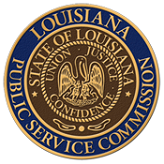|
About the Louisiana Public Service Commission The Louisiana Public Service Commission (LPSC) is an independent regulatory agency dedicated to serving the public interest by assuring safe, reliable, and reasonably-priced services for public utilities and common carriers. The LPSC consists of five elected Commissioners who serve overlapping terms of six years and a main office staff, created by Article IV, Section 21 of the 1921 Constitution of the State of Louisiana. It succeeded the Railroad Commission of Louisiana that was created by the 1898 Constitution. The overall goals of the Commission are to ensure a regulatory balance that enables utilities to provide customers with safe, adequate and reliable service, at rates that are just and reasonable, equitable and economically efficient, and that allow utilities an opportunity to earn a fair rate of return on their investment. The Commission provides a thorough but efficient regulatory process that is fair, open, encourages public participation, and anticipates the demands of an evolving regulatory environment. The Commission has jurisdiction over utilities providing electric, water, wastewater, natural gas, and telecommunication services, as well as all the electric cooperatives in Louisiana. The LPSC also regulates intrastate transportation services including passenger carrier services, waste haulers, household goods carriers, non-consensual towing, and intrastate pipelines. The companies under the Commission’s jurisdiction must obtain approval before instituting new rates, issuing stocks and bonds, transferring assets, and undertaking major construction projects such as additional power plants, transmission lines, etc. Municipally owned utilities are not under the jurisdiction of the Commission. LPSC implemented the "Do Not Call" Program throughout Louisiana on January 1, 2002. In addition, the Commission continues to take an active and cautious role in development of a competitive, market-based approach to utility regulation whenever such an approach is in the public interest. The Commission is required by the Louisiana Constitution to maintain its chief office at the site of the State Capitol and is required by law to conduct monthly meetings. The Chief Executive Officer of the Commission is the Executive Secretary. The Executive Secretary is appointed by and responsible to the Commissioners for the Commission’s day-to-day operations. The Commission Staff consists of administrative law judges, attorneys, auditors, economists, engineers, professional and clerical support, and rate analysts. The Staff is organized into nine Divisions (see the organizational chart for more information). All Divisions have a Division Head who reports directly to the Executive Secretary. The LPSC has sole jurisdiction for utility regulation on the state level, but several agencies on the federal level perform similar regulatory functions. These include the Federal Communications Commission (FCC), the Federal Energy Regulatory Commission (FERC), the Nuclear Regulatory Commission (NRC), and the Department of Energy. The LPSC works harmoniously with these agencies through its Legal Department. About the Louisiana Public Service Commission The Louisiana Public Service Commission (LPSC) is an independent regulatory agency dedicated to serving the public interest by assuring safe, reliable, and reasonably-priced services for public utilities and common carriers. The LPSC consists of five elected Commissioners who serve overlapping terms of six years and a main office staff, created by Article IV, Section 21 of the 1921 Constitution of the State of Louisiana. It succeeded the Railroad Commission of Louisiana that was created by the 1898 Constitution. The overall goals of the Commission are to ensure a regulatory balance that enables utilities to provide customers with safe, adequate and reliable service, at rates that are just and reasonable, equitable and economically efficient, and that allow utilities an opportunity to earn a fair rate of return on their investment. The Commission provides a thorough but efficient regulatory process that is fair, open, encourages public participation, and anticipates the demands of an evolving regulatory environment. The Commission has jurisdiction over utilities providing electric, water, wastewater, natural gas, and telecommunication services, as well as all the electric cooperatives in Louisiana. The LPSC also regulates intrastate transportation services including passenger carrier services, waste haulers, household goods carriers, non-consensual towing, and intrastate pipelines. The companies under the Commission’s jurisdiction must obtain approval before instituting new rates, issuing stocks and bonds, transferring assets, and undertaking major construction projects such as additional power plants, transmission lines, etc. Municipally owned utilities are not under the jurisdiction of the Commission. LPSC implemented the "Do Not Call" Program throughout Louisiana on January 1, 2002. In addition, the Commission continues to take an active and cautious role in development of a competitive, market-based approach to utility regulation whenever such an approach is in the public interest. The Commission is required by the Louisiana Constitution to maintain its chief office at the site of the State Capitol and is required by law to conduct monthly meetings. The Chief Executive Officer of the Commission is the Executive Secretary. The Executive Secretary is appointed by and responsible to the Commissioners for the Commission’s day-to-day operations. The Commission Staff consists of administrative law judges, attorneys, auditors, economists, engineers, professional and clerical support, and rate analysts. The Staff is organized into nine Divisions (see the organizational chart for more information). All Divisions have a Division Head who reports directly to the Executive Secretary. The LPSC has sole jurisdiction for utility regulation on the state level, but several agencies on the federal level perform similar regulatory functions. These include the Federal Communications Commission (FCC), the Federal Energy Regulatory Commission (FERC), the Nuclear Regulatory Commission (NRC), and the Department of Energy. The LPSC works harmoniously with these agencies through its Legal Department. |



